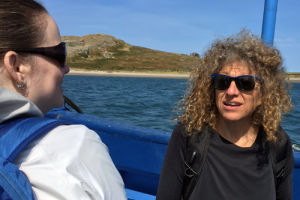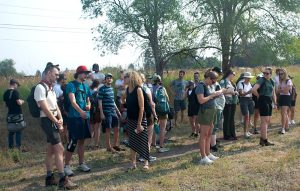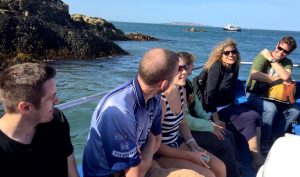Science Writing Merges Critical Thinking and Experiential Learning
Published November 15, 2024

The MA in Science Writing program at Johns Hopkins University offers a unique blend of online learning with hands-on experiences aimed at equipping students with both critical thinking and practical writing skills.
Program Director Melissa Hendricks emphasized the program’s commitment to fostering diverse learning opportunities through a required residency course and focusing on nurturing rigorous, responsible reporters.
“We do a lot of cool things,” Hendricks said. “These courses are like a guided reporting lab, where students practice and gain real-life experience.”
The residency options vary in location and theme, ranging from “Medicine in Action,” held at Johns Hopkins Medicine institutions, to “In the Wild,” which took place at the University of Montana, exploring wildfire management and wildlife biology.

The courses immerse students in real-world scenarios, allowing them to engage directly with experts, including Nobel Prize winners, and observe firsthand the subjects of their writing.
While the program is primarily delivered online, Hendricks noted that the residencies set their curriculum apart from other science writing programs.
“It’s not just Canvas or Zoom,” she said. “Our in-person residencies provide an invaluable and intensive learning environment that enriches students’ understanding and reporting.”
Beyond residencies, the program stresses the importance of critical evaluation in science writing, teaching students to scrutinize scientific claims, assess biases, and question research methods.
“The role of a science writer isn’t just to be a messenger. You’re here to analyze for the general reader,” said Hendricks, explaining a key principle that aligns with the program’s Good Science Fellowship. The Fellowship funds journalism projects that explore the integrity of scientific practices and funding.
Additionally, the program’s flagship publication, The Science Writer, offers students real-world editorial experience and a professional platform through which to showcase their work.
 “An all-volunteer alumni board rigorously edits the magazine, and students learn to refine and pitch their stories and meet deadlines—just like in the professional world,” Hendricks said.
“An all-volunteer alumni board rigorously edits the magazine, and students learn to refine and pitch their stories and meet deadlines—just like in the professional world,” Hendricks said.
The magazine offers students a chance to hone their skills, producing articles on topics ranging from climate change to biomedical research.
In a rapidly evolving media landscape, Hendricks acknowledged the growing challenges posed by AI and misinformation. She stressed the importance of teaching students who are engaged in the creative writing process about AI’s potential uses and the ethical challenges AI presents in journalism.
“We tell students they may not use generative AI to produce stories for class assignments,” she said, emphasizing the importance of developing an original and authentic human voice in writing.
The program’s recently revised Communicating Climate Change course reflects the growing need to address emerging environmental issues.
“It’s not just about explaining the science anymore,” she said. “Climate change, for instance, touches every newsbeat—health, business, energy, even sports. We prepare our students to incorporate science if it is relevant to their story.”
For Hendricks, the mission of science writing remains clear.
“Writers are needed more than ever to bridge the gap between scientific achievement and public understanding,” she said. “Our program is here to help them do that with integrity, accuracy, finesse, and skill.”
Interested in pursuing a graduate degree at Johns Hopkins University?
Request information to learn more or apply here.